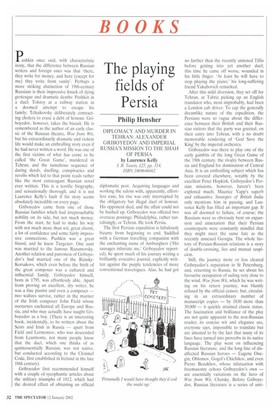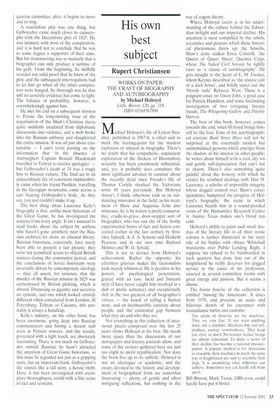The playing fields of Persia
Philip Hensher
DIPLOMACY AND MURDER IN TEHRAN: ALEXANDER GRIBOYEDOV AND IMPERIAL RUSSIA'S MISSION TO THE SHAH OF PERSIA by Laurence Kelly I. B. Tauris,125, pp. 314, ISBN 1869646662 Pushkin once said, with characteristic irony, that the difference between Russian writers and foreign ones was that 'there, they write for money. and here (except for me) they write from vanity'. Perhaps a more striking distinction of 19th-century Russians is their impressive knack of dying grotesque and dramatic deaths: Pushkin in a duel; Tolstoy at a railway station in a doomed attempt to escape his family; Tchaikovslcy deliberately contracting cholera to erase a debt of honour. Griboyedov, however, takes the biscuit. He is remembered as the author of an early classic of the Russian theatre, Woe from Wit, but his extraordinarily dramatic and violent life would make an enthralling story even if he had never written a word. He was one of the first victims of what has come to be called 'the Great Game', murdered in Tehran, and the tumultous sequence of daring deeds, duelling, conspiracies and revolts which led to that point reads rather like the most extravagant Russian novel ever written. This is a terrific biography, and sensationally thorough, and it is not Laurence Kelly's fault if his story seems absolutely incredible on every page.
Griboyedov came from one of those Russian families which had irreproachable nobility on its side, but not much money. From the start, he had to make his way with not much more than wit, great charm, a lot of confidence and some fairly impressive connections. Pushkin was a great friend, and he knew Turgenev. One aunt was married to the famous Razumovsky. Another relation and patroness of Griboyedov's had married one of the RimskyKorsakovs. which even before the birth of the great composer was a cultured and influential family. Griboyedov himself, born in 1795, was effortlessly able. Apart from proving an excellent, dry writer, he was a fine pianist and even a composer — two waltzes survive, rather in the manner of the Irish composer John Field whose nocturnes enchanted all Europe and Russia, and who may actually have taught Griboyedov as a boy. (There is an interesting book, incidentally, to be written about the Scots and Irish in Russia — apart from Field and Lermontov, who was descended from Learmonts, not many people know that the duel, which one thinks of as quintessentially Russian, was not native, but conducted according to the Clonmel Code, first established in Ireland in the late 18th century).
Griboyedov first recommended himself with a couple of sycophantic articles about the military triumphs of 1812, which had the desired effect of obtaining an official diplomatic post. Acquiring languages and working the salons with, apparently, effortless ease, his rise was only interrupted by the obligatory but illegal duel of honour. His opponent died, and the affair could not be hushed up. Griboyedov was offered two overseas postings; Philadelphia, rather tantalisingly, or Tehran. He took Persia.
The first Persian expedition is fabulously bizarre from beginning to end. Saddled with a German travelling companion with the enchanting name of Amburgherr (`His sausages infuriate me.' Griboyedov reported), he spent much of his journey writing a brilliantly evocative journal, explicitly written against the purple tendencies of more conventional travelogues. Alas, he had got no further than the recently annexed Tiflis before getting into yet another duel; this time he came off worse, wounded in his little finger. 'At least he will have to stop playing the piano,' his long-suffering friend Yakubovich remarked.
After this mild diversion, they set off for Tehran, at Tabriz picking up an English translator who, most improbably, had been a London cab driver. To cap the generally dreamlike nature of the expedition, the Persians were so vague about the difference between their British and their Russian visitors that the party was greeted, on their entry into Tehran, with a no doubt memorable rendering of 'God Save the King' by the imperial orchestra.
Griboyedov was there to play one of the early gambits of the long Great Game of the 19th century, the rivalry between Russia and England for domination of Central Asia. It is an enthralling subject which has been covered elsewhere, notably by the excellent Peter Hopkirk. Griboyedov's Persian missions, however, haven't been explored much; Maurice Yapp's superb and exhaustive Strategies of British India only mentions him in passing, and Laurence Kelly has filled an important gap. It was all doomed to failure, of course; the Russians were so obviously bent on expansion and annexation that their Persian counterparts were constantly mindful that they might meet the same fate as the recently annexed Georgia. The whole history of Persian-Russian relations is a story of double-crossing, lies and mutual suspicion.
Still, the journey more or less cleared Griboyedov's reputation in St Petersburg, and, returning to Russia, he set about his favourite occupation of sailing very close to the wind. Woe from Wit, which he was writing on his return journey, was bluntly refused by the official censor, but, circulating in an extraordinary number of manuscript copies — by 1830 more than 30,000 — it quickly attained classic status. The fascination and brilliance of the play are not quite apparent to the non-Russian reader; its concise wit and elegance are, everyone says, impossible to translate but are attested to by the fact that many of its lines have turned into proverbs in its native language. The play went on influencing Russian literature, and the long line of disaffected Russian heroes — Eugene Onegin, Oblomov, Gogol's Chichikov, and even Pierre Bezukhov, whose infatuation with freemasonry echoes Griboyedov's own — are essentially variations on the hero of Woe from Wit, Chatsky. Before Griboyedov, Russian literature is a series of anti
quarian curiosities; after, it begins to move and to sing.
A scandalous play was one thing, but Griboyedov came much closer to catastrophe with the Decembrist plot of 1825. He was intimate with most of the conspirators, and it is hard not to conclude that he was to some degree a supporter of their aims. But his manoeuvring was so masterly that a biographer can only produce a surmise of his guilt. From the beginning, he skilfully avoided any solid proof that he knew of the plot, and the subsequent interrogations had to let him go when all the other conspirators were hanged. So thorough was he that still no concrete evidence has come to light. The balance of probability, however, is overwhelmingly against him.
He met his end on a subsequent mission to Persia; the long-running issue of the repatriation of the Shah's Christian slaves quite suddenly escalated from diplomatic discussions into violence, and a mob broke into the Russian embassy and slaughtered the entire mission. It was all just about containable — I can't resist passing on the information that 'in the absence of Amburgherr Captain Ronald Macdonald travelled to Tehran to receive apologies' — but Griboyedov's death at 34 was a tragic loss to Russian culture. The final act in an extraordinary life of consistent implausibility came when his friend Pushkin, travelling in the Georgian mountains, came across a cart bearing Griboyedov's body. As they say, you just couldn't make it up.
The best thing about Laurence Kelly's biography is that, unlike most historians of the Great Game, he has investigated the sources from every angle. It isn't unusual to read books about the subject by authors who haven't gone anywhere near the Russian archives, let alone an oriental library. Russian historians, conversely, have rarely been able to present a fair picture: they were not permitted access to official British sources during the communist period, and the conclusions of Soviet historians were invariably driven by contemporary ideology — they all assert, for instance, that the murder of the Russian mission in 1829 was orchestrated by British plotting, which is absurd. Discussing so gigantic and secretive an episode, and one which looked entirely different when considered from London. St Petersburg. Tehran or Calcutta, this partiality is always a handicap.
Kelly's industry, on the other hand, has been enormous, going deep into Russian commentators and having a decent stab even at Persian sources, and the results, presented with a light touch, are absolutely fascinating. There is not much on Griboyedov outside Russian, he hasn't attracted the attention of Great Game historians, so this must be regarded not just as a gripping story, but an important book. Griboyedov's life sounds like a tall story, a heroic myth. Here, it has been investigated with exemplary thoroughness, retold with a fine sense of tact and restraint.



























































 Previous page
Previous page